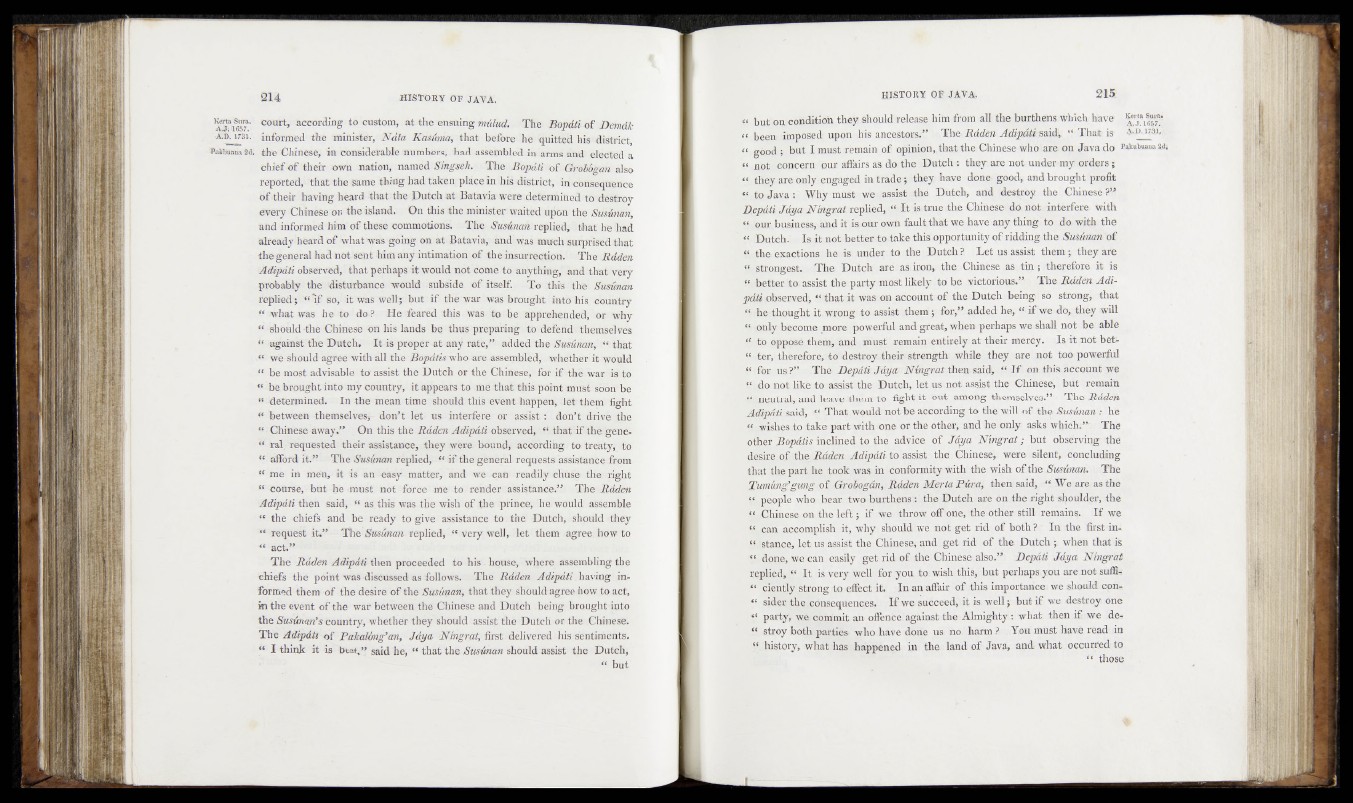
fflgK g court, according to custom, at the ensuing mûlud. l i e Bdpdü&f Bm dk
« § § informed the minister, Ndta Kasiima, that before he quitted his district
-Pakbuanaid. the Chinese, in 'Considgtabte aBlatfihëfs, had assembled in arms and elected a
chief of their ©wii nation, named Singseh. The Sepdti o î Çéiebbgan also
reported, that the .same thing had taken place in his district, in consequence
Of-their having heard that the Dutch at Batavia were determined to destroy
every Chinese on the island. On this fhemmister waited:®^« the Sménan,
and informed him of these commotions The Sménan replied, that he had
already heard of what was going on at Batavia, and was much surprised that
the general had not sent him any intimation of the insurrection. ' The Rdden
Adipdti observed, that perhaps it would not come to anything, ' and that very
probably the disturbance would subside of itself. To this the Susunan
repBedl’-**^? ëo, it Was wel%-but if the war was brciught into Ms. hb'uhtry
** -what was he to do? He feared this was to fee. apprehended, or. why
** should -the 'Chinese -on his lands be thus preparing to defend. -themselves
*S against the Dutch. It is proper at any rate,” ^à^àlb&Susûnan, “ that
“ we should agree with all the jSojedte'-ï who «re assembled, whether: it-would
“ be most advisable to' assist the Dutch or the Chinese, for if >the war is to
“ be brought into my country, it appears to me that this point ®uB£ söö)i‘be
w determined. In the mean time should -this event happen; -lefctbèm fight
» between fhemselvesr don’t let us interfère or'assfet'J .don’t drivé the
“ Chinese away.” On ibis the Rdden Adipdti observed, >fi teat I f ’thàgené-
“ ral. requested their assistance, they were bound} according: tortrekty, to
“ afford kJt- The Sménan replied, “ if the general requests assistance from
« me in men, it is an easy matter, and we .can readily chùs.ë' the right
“ course, - bat fee «must not force me to - render assistance.” Tfee Rdden
Adipdti then said, “ as this was the wish of the sptince,'\hö would assemble
“ the chiefs and be ready to give assistance to the ©uteh, should -they
“ -request Iti’’ 'The Smûnan replied, -f^Very. well,, let them agree how to
p! act,”lL‘>:J
The Rdden Adipdti then proceeded to his. hquse, where assembling the
•chiefs the point was discussed As follows. Thé Rdden Adipdti having informed
them of the desire of the Smüqan, that'they should agree how tO:act,
in the event of the war between the Chinese and Dutch being, brought into
the ShstfeamVcountry, whether they should assist the Dutch or the Chinese.
The Adipdti of Pdkàtông’m , Jay a Jsfingrat, first delivered his sentiments.
“ I think it is b t< ” said he, ** that the Sménan should assist the Dutch,
“ but
« but on condition they -shoMdlreleasg him-from all. the burthens:which, have
“ been imposed upon ,his- ancestors;” Rdden ActipM-sais^, “ That: is &3>-:nai,A
“ gôjody but I must .remain ofi opinion, thçt the, Chinese who Sare on Java do EsMmaaaï*
« not concern puf afiairs as do. the Dutch« they are not under-my orders ;
«< they are only engaged in trade.-;: •they have done, goQ% and brought profit
«- to Java îi Wfhy'mbsfe'wfe, assist rthe Dutch, and destroy, the Chinesé W
D.epdti JdyavNoigmt. replied, “ It is,feue Abe CMhesefdn not. Interfere: with
». tp^business, and if is our own fanltthat we. have any. thingito do, with thé
•*, iDutchi Isdfc.not betterrto-take this opportunity qf riddângitbe Susun'an.'o£
i‘ the exactions he: isi undelete. -the ; Dutch? .Let us assist them;i teeyàrte
strongest - The Dutch-are as. iron; the. Chinfese^aS.tiç-; /therefore it is-
itj-befeer itoj assist tee-party most likely, to be vietbrioqsJj’.c The Rddenr Adipdti.
.observed) ‘h'that’ifc was on account-of the Dutch being so strong, that
%rhe thought it wrong to assist thees ;. 'for,” added he, M if we do, they will
%Qntyteénome.moré;/powerfdl,?a®d great, when perhaps we-shaH noti be able
f sto opposé .them, and i must' oiemain. entirely at tifeeir Hiercy..v^Is,i t tnofcbet1-
feterj'.thbreforejrtotdestr-oy-theif* strength» whilp teeylaçe not too powei^ul
feîftsst'usjÉKb^ The Bepâti Jdyai'Nmgnatth&n saidf, “ Ifi ont thi&àdephst jve
-«aAsjjot -lijcfezto assist-the- Duteh>, let ustruot a^isttmerj€hihése>’ but remain
tfdne.utral, and leave them to figbt it but among tecrnselvesi”'- The Rdden
Adipdti said, ;S‘ .That would not be ac£©rdi»g-to the will of .tile Susànan DMé -
« .wishes ,to -take part with tone or-the otihear; and he only asks which;”'. The
ótMx'Êopdth inctoed tojire advice of Jâya N ingpatjXm observing: qhé
desire of {the 'Raden Adipdti to Assiste the Chinese, were silent, concluding
that tfe.epn.rtAe took was in conformity- with the wish ofithe Smémn- The
%bm6ng?gwtd'.p£\ Gto$ogan,iRitki&i MertaPéra> then said, •“ Wo are as the
“ sPgople-who bear two burthensi: the Dutch are on the right shoulder,-the
“ «Chinese on tee left'; if\we throw off!one, theiofSea'fstilln'remai^. I f we
$Lqan accomplish it; why shöuldlwe.-nqifcgêferid of both? • Inithe IrrtIn*
(Stance, le i us assist the Chinese, and get rid :©f the. Dutch-; when that is
fhmftj - « ran oasilv get rid of-jtihe, Chinese, alsoJ'; Depati JAym Mxmgtiià .
replied, “ It is very well &r;you to:-wish: this, -but perhapsyou are not suffix
'&P cientlyafeopg,to..effect it. In.an-affair of .this importance, we should cpn=
b sider the consequences. K we. succeed-, it is. well but if we destrqyi one
“ party, we commit an offenfce.against the Almighty : what then ifi: we .d®,
V stroy both parties- who-.have done us nor harm?,. ;,Toa must Kavérèadriö
^. history, what has happened in the land: of Java, and what occurred: to
‘‘ those